Early this year, a Rand Corporation researcher wrote: “…. we find specific causal evidence that the elements of the order (International Order) were either a necessary condition or a strongly contributing variable to realising values ranging from tens of billions of dollars in some cases to hundreds of billions in others.”1 While this may be considered as an accountant’s view of the post-WW II international order, the fact that international order generated cold cash, was a strategic leap of faith for an essentially protectionist USA (the two huge oceans on each coast contributed to that mindset then).
The strategy the California-based Think Tank came up with had also embedded in it the logic of its economy. The monograph quoted above, stated: “…the US-led order has served as an important source of US competitive advantage in the postwar world. As the leader and sponsor of a multilateral order, the US has not been merely another great power. It has been the architect of a system of mutual advantage, a role that has allowed the United States to tie its power to a broadly endorsed purpose.”
The US as a global hegemon has enjoyed such advantages for little less than a century. But this role was its dividend for first containing and then defeating the socialist-imperialist superpower, the USSR. However, that unipolar moment was short, arguably from 1989 to 2001. And the stress and strain of being the top honcho showed rather significantly as the rapacious neo-liberalist capitalism reached its tipping point in 2008 financial meltdown in the Western world. While South, East and South-East were saved from the ravages of the crises that followed 2008, the search for a new power alignment for a new global order began.
Donald J Trump, the 45th president of the country does not see merit in this ‘multilateralism’ – as Rand would have us believe - that may have been mostly restricted to the Western European nation-states led by a ‘power-elite’ (the sociologist C Wright Mills had coined the term) that had cut its teeth as leaders of Allied Powers of the contemporary geo-politics and geo-strategy during WW II and in its aftermath.
Considering this, the incumbent US administration (not everyone of his Cabinet may be on that same page) believes that over time, this country’s endorsement has served more those who had recovered from the price paid for the war efforts that had impoverished them. The proverbial last straw was China’s ‘reform and opening up’ programmes. Deng Xiaoping led the nation on a path that helped it to cash in its chips for the support it had provided to its Western partner during the Cold War. Result: Beijing now can boast of a five trillion USD economy and is on an inflection point of taking over from the retreating US not just the first spot on the global GDP table, but also the leadership of the world.
So, in effect, the US retrenchment of its global responsibilities is evident from President Trump’s recent swing-by to two important European capitals, Brussels and London. At each of his destinations, he reiterated the refrain of money. In Brussels he urged the NATO partners to get more involved in pledging more money for the bulwark that served them so well ever since the end of the WW II. Despite the presence of two superpower camps dividing the world between themselves, these powers did not need to use their nuclear weapon arsenals that could destroy the world many times over.
However, that did not stop them from engaging in proxy wars in the developing world. This also reflected the fact that the existing international order was not fully immune from political and strategic manipulations by the those who were strong. It is this memory, which puts paid the theory of having a geo-political construct - that can bring and sustain a truly multi-national structure, and which emancipates the nation-states from their apparently ‘natural instinct of causing anarchy.’ Currently, this is the fear that is gnawing at the world system with a withdrawing USA and withdrawn Europe still reeling from the financial disaster of 2008. This crisis caused what is now known as the ‘Great Recession.’
The most opportune moment has arrived thus, for some of the emergent powers to take on the onerous task of being revisionist powers, who seek a more participatory Rules Based International Order. China’s President Xi Jinping first hinted at how his power-elite was looking at the contemporary world and China’s role in that. Davos World Economic Forum Summit of 2017 thus afforded Xi a keynote speech opportunity. At the picturesque setting of the Swiss resort he had said, “Countries, big or small, strong or weak, rich or poor, are all equal members of the international community. As such, they are entitled to participate in decision-making, enjoy rights and fulfill obligations on an equal basis. Emerging markets and developing countries deserve greater representation and voice.” This was also the underlying thought behind the Belt and Road Initiative (BRI), which he had unveiled a year earlier.
Having said that, the man who really put muscles on Xi’s skin and bones idea was Indian Prime Minister Narendra Modi. Earlier in the year during his keynote address at the Shangrila Dialogue, held in the city-state, Singapore, PM Modi had stated, “We believe that our common prosperity and security require us to evolve, through dialogue, a common rules-based order for the region. And, it must equally apply to all individually as well as to the global commons. Such an order must believe in sovereignty and territorial integrity, as well as equality of all nations, irrespective of size and strength. These rules and norms should be based on the consent of all, not on the power of the few. This must be based on faith in dialogue, and not dependence on force. It also means that when nations make international commitments, they must uphold them. This is the foundation of India's faith in multilateralism and regionalism; and, of our principled commitment to rule of law.”
So, the question is whether India and China are ready take ownership of the Rules Based International Order that can be created out of the debris of the old international order? Historically, India has punched above its weight in the international arena. This has been based on two factors: One, its moral position in the world for attaining independence through mostly non-violent means and, immediate promulgation of a Constitution which, figuratively speaking, brought under its tent, the diverse peoples of the country; and two, the country had as its first prime minister, Jawaharlal Nehru, a internationalist of great repute and a democrat to the core.
Thus while it had a large population who were abjectly poor and on the edge of destitution, its voice could be heard as the voice of reason in nations that were being de-colonised and gaining freedom and liberty. India’s first international task, equally challenging under the UN auspices, was when it sought to keep peace between the two combatting sides in the Korean War. This tradition of ‘blue helmet’ responsibilities is still being undertaken by the country under the UN aegis, even though the task of building a State and a Nation is still not complete.
If one cuts back to the present, one sees the spectre of the current times framed in Nehruvian terms. In Modi, the country found a leader who seemed to believe that India’s international stature was as important as the myriad responsibilities his government had in dealing with its evolution as a strong State. It is at the moment debatable whether the comparatively young prime minister would have the same legacy of Nehru in the domestic front – one of big failures, dotted with some spectacular successes.
Be that as it may, let us return to the idea of a Rules Based International Order that the country can continue to work on. India at this time is playing the role of the balancer between the two contending major powers, once the lone, full-scope superpower, the USA, and the incumbent economic superpower, China, that has to align its military muscle with its global economic clout. Even as the South Asian giant begins to learn that only national interests are permanent, this country has still some distance to go in its new, realist avatar. The economy still has the tailwind propelling it, but some tempering has taken place in the growth path as the NDA II, learning from its ‘India Shining’ NDA I, concentrates on the quality and not just the quantity of economic growth. For quantitative ‘growth fundamentalists,’ the public goods and services, are expected to percolate on their own as ‘trickle down. At the end, it remains just that, a trickle.
But the post-2008 Great Recession has compressed the time for a global powershift. China with its enhanced ‘comprehensive national power’ (CNP) is already in the arena for a competition with the USA as the primus interperes slot among nations. India must, at some point in time, pick up the slack and have it writ that in this new Rules Based International Order, many of the norms and values are clearly Indian. Post-Wuhan summit – one that took place between Chinese and Indian leaderships - Beijing seems more assured in dealing with its neighbour and possibly have the credit shared for the formation of the new, Rules Based International Order.
Both these countries now are seeking to shape the institutions of the this emerging international order as they demand reforms in the UN system and the Bretton Woods institutions, failing which they hold the threat they would create parallel systems. On the economic front, as much as we have seen the formation of economic institutions – still nascent – there are parallel political blocks of major, advanced, developing nations. Unless the UN is ready to reform itself and its allied bodies, these newly created blocks would begin administering through miniaturised multilateral institutions functioning under the new Order.
That could denude the 193-member UN many of its current powers under the various chapters of its Charter, and turn it into a seemingly useless relic of the ancien regime. This prospect itself can rob the sleep of many leaders of what is called developed world of the Northern Hemisphere. Thus, that this path can be the end of the UN system in a way of its more imperfect predecessor, the League of Nations, is evidently bringing jitters to the establishments of the Western nations. Emergent major powers, on the other hand, are still nibbling at the edges as they seek shaping the milieu for their version of the Global Order.
Endnotes
(The paper is the author’s individual scholastic articulation. The author certifies that the article/paper is original in content, unpublished and it has not been submitted for publication/web upload elsewhere, and that the facts and figures quoted are duly referenced, as needed, and are believed to be correct). (The paper does not necessarily represent the organisational stance... More >>
Image Source: https://upload.wikimedia.org/wikipedia/commons/8/8d/Prime_Minister_of_India_Narendra_Modi_and_President_of_China_Xi_Jinping_before_the_beginning_of_the_2017_BRICS_Leaders%27_meeting.jpg

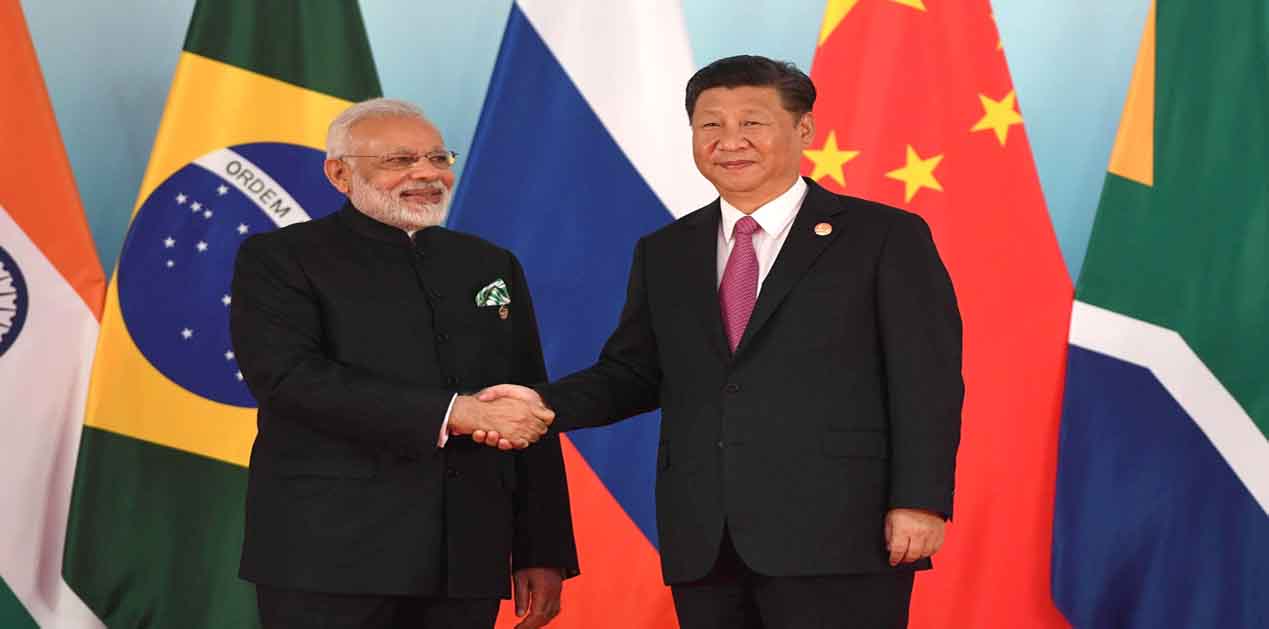


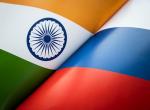
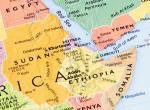
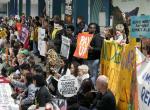
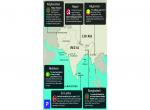
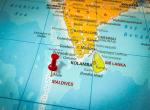

Post new comment